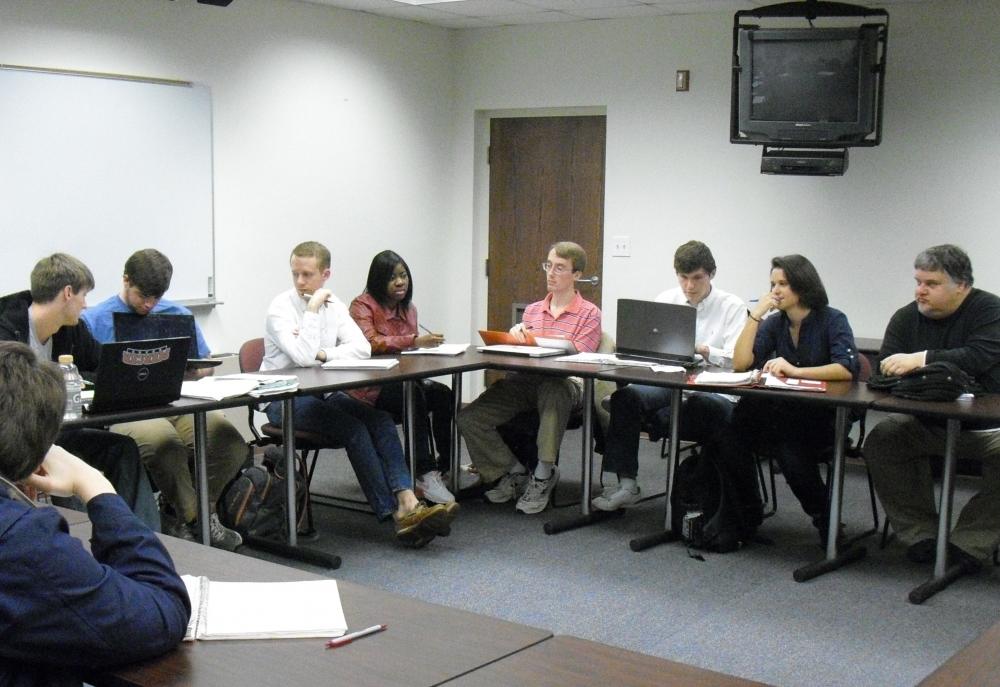
Section Branding
Header Content
Georgia's Young Voters Enthusiastic
Primary Content

While Republicans continue to battle it out in advance of the Super Tuesday, presidential preference primary President Obama’s re-election team this week kicked off a tour of colleges and universities in several states. Right now no Georgia schools are on their schedule. But, Georgia’s college students across the spectrum are politically engaged.
Twenty students in a Mercer University political science class are locked in a discussion about the upcoming Super Tuesday primary in Georgia.
“I think they’ll win in a lot of places where they should already win and they’ll do really poorly in places that they need to win.”
The kids in Chris Grant’s Presidential Politics and the Media Class are mostly upper classmen majoring in Political Science and nearly all of them plan to vote next week including Tyler Bishop.
“I’m going to vote for Newt Gingrich.”
The class is pretty evenly split between Democrats, Republicans and Independents like Andre Fleming who likes Ron Paul. He says this primary lacks the energy of its Democratic counterpart in 2008.
“I’m not sure if we’ll ever see anything like we saw with Obama and the young Democratic vote. I think there’s a disconnect sometimes between the Republican Party and younger voters.”
But that’s not necessarily the case with younger voters here in the Peach State. In 2008 nearly 51 percent of voters under 30 cast a ballot for Republican presidential candidate John McCain.
And the University of Georgia has the largest College Republicans chapter in the nation with nearly 800 members. A month ago they signed up 200 new voters during an on campus drive.
Elliott Echols is the State Chair of the group, and he says most students he talks to are worried about the same things adults are, jobs and the economy.
“It’s the fear that students are going to be able to graduate and have a degree that they had to spend a lot of money on and then they’re going to have nothing to show for it. They’ll not have a job. They’re not ready for the workforce and they’re having to live at home with their parents.”
Echols says the College Republicans are drawing in younger voters. Next month they’ll add 2 more campus chapters to the 30 they already have across the state.
And while she doesn’t plan to support the GOP Mercer senior Liz Bibb says she understands why some of her classmates do. She used to place more of a priority on social issues, but that’s changing.
“Even though I consider myself a Democrat, I’m more fiscally conservative the closer I get to graduating and going out into the working world.”
But, Professor Chris Grant says he doesn’t think we’ll see anything close to the enthusiasm of young voters in 2008. And it may have nothing to do with the candidates.
“I think part of that’s because the economy has been where it’s been and we’ve not been as optimistic as perhaps we should be and I don’t think we feel like there’s great leadership opportunities in any direction not because the people aren’t good. It’s just the situations aren’t great.”
Newt Gingrich campaign volunteer and Mercer junior Tyler Bishop says no matter the outcome of the primary he has to stay positive.
“I would like to say I am hopeful for my future because I work so hard in school and I want to get in a good law school. I guess just the American dream, fend for myself, and take care of a family.”
According to the most recent census figures more than 1.5 million people under age 30 are eligible to vote in Georgia, but the question remains, how many of them will actually come out to vote.
Tags: Georgia, Mercer University, Josephine Bennett, Super Tuesday, young voters, Georgia College Republicans
